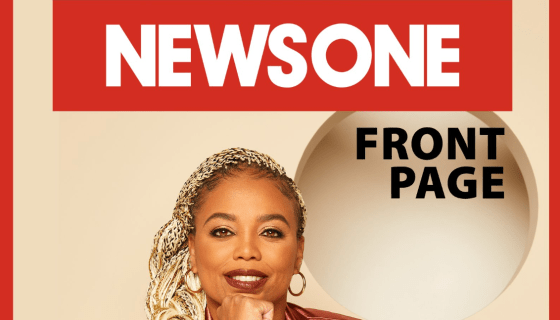What up, doe?
A journalist and proud Detroit native is covering an inaugural digital cover in Unbothered and beautiful fashion.
Source: Source: Michael Rowe for NewsOne / Michael Rowe for NewsOne
Jemele Hill is gracing Front Page, NewsOne’s new editorial series that recognizes and celebrates agents of change around the country making waves in their respective communities. In an exclusive interview with Clarissa Brooks, Hill goes into great detail about her journey from a humble start in Detroit all the way to the top of the journalism world complete with a thriving podcast network and a new memoir, among other notable ventures.
See excerpts from Jemele Hill’s Front Page feature below.
On the political landscape growing up in Detroit:
So, when I was a kid, we had a mayor named Coleman A. Young, and he was the city’s first Black mayor. And Coleman Young was a real source of pride for a lot of us because not only did he look like us and act like us, he didn’t code-switch either. And he was so unapologetic about how he chose to lead in that position that it was very inspirational and aspirational for a lot of us who were watching at the time. And Detroit was going through some significant challenges with a very high unemployment rate compared to what the rest of the country looked like. It is a blue-collar city because, obviously, it’s an auto factory town. And that breeds a much different mentality, I think, in the people there. That’s why certainly no one from Detroit is any stranger to having to work hard, having to hustle. It’s just kind of built into our bones.
On who was “showing up for her” in the Detroit community:
Well, as with everything, it starts in your house. And my mother was definitely that person, as was my grandmother. And they were two huge influences on me as I grew up in this city. And especially, you know, as a family, we went through a lot of challenges. But they still had expectations and standards. Getting an education was one. And because it was so important to them, it was by extension important to me. So the idea of me going to college was a foregone conclusion. It was never a thought process that I was not going to college. And I’m very thankful because those are the things that they instilled in me outside of that, and this is something that really amazes me.
I run into people all the time, Black folks, who talk about how when they grew up, they didn’t have any Black teachers. And that was so stunning to me because Detroit is Blackity Black-Black-Black. All my teachers were Black. And while the idea of, say, Black History Month – we knew what it meant, obviously. But Black History Month wasn’t a big deal because Black History Month happened eight months out of the school year (laughs). Because you have Black teachers, they understand the importance of Black history all the time.

Source: Source: Michael Rowe for NewsOne / Michael Rowe for NewsOne
On writing her memoir:
A memoir is not something I ever intended to write. I didn’t really want to write about myself. Now, I want to write fiction. And I didn’t have any problems drawing from experiences and then turning that into some, you know, fictional content. But writing about real-life events and things that happened to me, it did not have much appeal to me. And when the book deal finally happened, I’m not the type of person who does things halfway. And I knew that if I wanted to really commit to this memoir, and I really wanted it to resonate with people, I had to be as open, honest and transparent as I possibly could.
It also presented me with an opportunity for people to understand the perspective that I have and what shaped me. And I knew that people would be really probably surprised by a lot of the childhood traumas that I had. How I was able to sort of build my career and what my journey looked like. I know it’s not like what they thought it was (laughs), you know? So for me, the moment that I began this process, it was one that was liberating. And it was also one that was very intentional because of what I wanted people to take away from it. […]
Writing for a living allowed journalist Jemele to treat myself like my own interview subject. I think that was a really core piece in the writing process of this memoir.
On mentorship and her mentors:
For me, there are several different kinds of and levels to mentorship. There are people who mentor you that you’ve never met, just by watching their careers and seeing how they move in the business. I had so many of those kinds of mentors.
Some of the best mentors I’ve ever had have been people who were not necessarily in my industry. Mentorship just looks different in a variety of ways. In the business, people like Michael Wilbon, Claire Smith, Kevin Merida, Rob Parker, the late Bryan Burwell — so many people who were either able to give me a piece of advice, handhold me through something or just listen and be a sounding board. So I’ve been very fortunate to have a lot of people who helped me nurture my career.
See more of Jemele Hill for NewsOne’s Front Page HERE.



